
George Harrison was an English musician, singer and songwriter who achieved international fame as the lead guitarist of the Beatles. Sometimes called "the quiet Beatle", Harrison embraced Indian culture and helped broaden the scope of popular music through his incorporation of Indian instrumentation and Hindu-aligned spirituality in the Beatles' work. Although the majority of the band's songs were written by John Lennon and Paul McCartney, most Beatles albums from 1965 onwards contained at least two Harrison compositions. His songs for the group include "Taxman", "Within You Without You", "While My Guitar Gently Weeps", "Here Comes the Sun" and "Something". Harrison's earliest musical influences included George Formby and Django Reinhardt; subsequent influences were Carl Perkins, Chet Atkins and Chuck Berry.

The Rutles were a rock band that performed visual and aural pastiches and parodies of the Beatles. This originally fictional band, created by Eric Idle and Neil Innes for a sketch in Idle's mid-1970s BBC television comedy series Rutland Weekend Television, later toured and recorded, releasing two studio albums and garnering two UK chart hits. The band toured again from 2002 until Innes' death in 2019.
The Concert for George was held at the Royal Albert Hall in London on 29 November 2002 as a memorial to George Harrison on the first anniversary of his death. The event was organised by Harrison's widow, Olivia, and his son, Dhani, and arranged under the musical direction of Eric Clapton. The profits from the event went to the Material World Charitable Foundation, an organisation founded by Harrison.

Dhani Harrison is a British-American musician, composer and singer-songwriter. He is the only child of George and Olivia Harrison. Dhani debuted as a professional musician assisting in recording his father's final album, Brainwashed, and completing it with the assistance of Jeff Lynne after his father's death in November 2001.
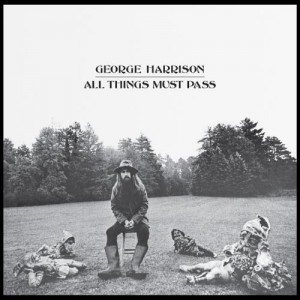
All Things Must Pass is the third studio album by the English rock musician George Harrison. Released as a triple album in November 1970, it was Harrison's first solo work after the break-up of the Beatles in April that year. It includes the hit singles "My Sweet Lord" and "What Is Life", as well as songs such as "Isn't It a Pity" and the title track that had been overlooked for inclusion on releases by the Beatles. The album reflects the influence of Harrison's musical activities with artists such as Bob Dylan, the Band, Delaney & Bonnie and Friends and Billy Preston during 1968–70, and his growth as an artist beyond his supporting role to former bandmates John Lennon and Paul McCartney. All Things Must Pass introduced Harrison's signature slide guitar sound and the spiritual themes present throughout his subsequent solo work. The original vinyl release consisted of two LPs of songs and a third disc of informal jams titled Apple Jam. Several commentators interpret Barry Feinstein's album cover photo, showing Harrison surrounded by four garden gnomes, as a statement on his independence from the Beatles.

"Layla" is a song written by Eric Clapton and Jim Gordon, originally recorded with their band Derek and the Dominos, as the thirteenth track from their only studio album, Layla and Other Assorted Love Songs (1970). Its contrasting movements were composed separately by Clapton and Gordon. The piano part has also been controversially credited to Rita Coolidge, Gordon's girlfriend at the time.

"Something" is a song by the English rock band the Beatles from their eleventh studio album Abbey Road (1969). It was written by George Harrison, the band's lead guitarist. Together with his second contribution to Abbey Road, "Here Comes the Sun", it is widely viewed by music historians as having marked Harrison's ascendancy as a composer to the level of the Beatles' principal songwriters, John Lennon and Paul McCartney. Two weeks after the album's release, the song was issued on a double A-side single, coupled with "Come Together", making it the first Harrison composition to become a Beatles A-side. The pairing was also the first time in the United Kingdom that the Beatles issued a single containing tracks already available on an album. While the single's commercial performance was lessened by this, it topped the Billboard Hot 100 in the United States as well as charts in Australia, Canada, New Zealand and West Germany, and peaked at number 4 in the UK.
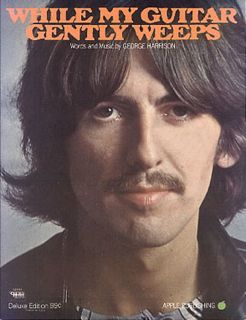
"While My Guitar Gently Weeps" is a song by the English rock band the Beatles from their 1968 double album The Beatles. It was written by George Harrison, the band's lead guitarist, as an exercise in randomness inspired by the Chinese I Ching. The song conveys his dismay at the world's unrealised potential for universal love, which he refers to as "the love there that's sleeping".
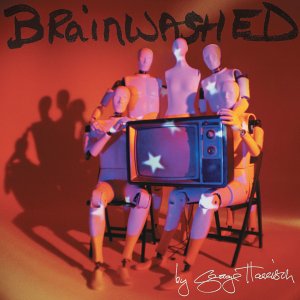
Brainwashed is the twelfth and final studio album by the English rock musician George Harrison. It was released posthumously on 18 November 2002, almost a year after his death at age 58, and 15 years after his previous studio album, Cloud Nine. Recordings began over a decade before Harrison's death but were repeatedly delayed. The album's overdubs were completed by his son Dhani, session drummer Jim Keltner, and longtime friend and collaborator Jeff Lynne.
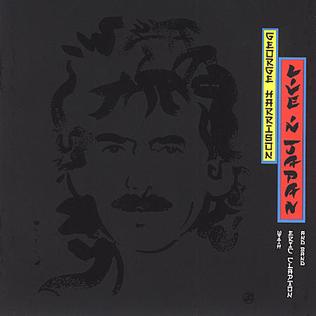
Live in Japan is a live double album by the English musician George Harrison, released in July 1992. Credited to "George Harrison with Eric Clapton and Band", it was Harrison's second official live album release, after 1971's Grammy-winning The Concert for Bangladesh. The album was recorded during his Japanese tour backed by Eric Clapton in December 1991, and it contains live versions of Harrison's work as a solo artist alongside many of his best-known Beatles songs. Aside from the 2001 reissue of All Things Must Pass, with previously unavailable bonus tracks, Live in Japan was Harrison's last release before his death in November 2001.
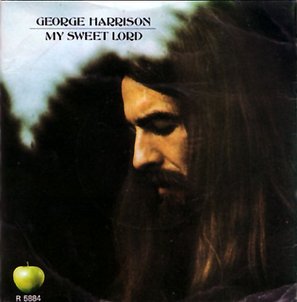
"My Sweet Lord" is a song by English musician George Harrison, released in November 1970 on his triple album All Things Must Pass. It was also released as a single, Harrison's first as a solo artist, and topped charts worldwide; it was the biggest-selling single of 1971 in the UK. In America and Britain, the song was the first number-one single by an ex-Beatle. Harrison originally gave the song to his fellow Apple Records artist Billy Preston to record; this version, which Harrison co-produced, appeared on Preston's Encouraging Words album in September 1970.

"Here Comes the Sun" is a song by the English rock band the Beatles from their 1969 album Abbey Road. It was written by George Harrison and is one of his best-known compositions. Harrison wrote the song in early 1969 at the country house of his friend Eric Clapton, where Harrison had chosen to play truant for the day to avoid attending a meeting at the Beatles' Apple Corps organisation. The lyrics reflect his relief at the arrival of spring and the temporary respite he was experiencing from the band's business affairs.

"Real Love" is a song written by the English musician John Lennon, formerly of the Beatles. He recorded six demos of the song in 1979 and 1980 with "Real Life", a different song that merged with "Real Love". In 1988, the sixth take was posthumously released for the documentary soundtrack Imagine: John Lennon. In 1995, his demo was completed by his former Beatles bandmates as part of the Beatles Anthology project, along with "Free as a Bird".
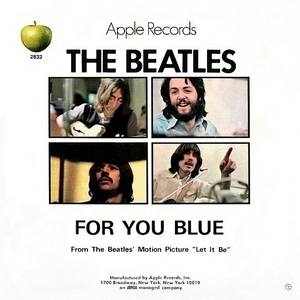
"For You Blue" is a song by the English rock band the Beatles from their 1970 album Let It Be. The track was written by George Harrison as a love song to his wife, Pattie Boyd. It was also the B-side to the "Long and Winding Road" single, issued in many countries, but not Britain, and was listed with that song when the single topped the US Billboard Hot 100 and Canada's national chart in June 1970. On the Cash Box Top 100 chart, which measured the US performance of single sides individually, "For You Blue" peaked at number 71.

"Never Without You" is a tribute song from Ringo Starr to his former Beatles bandmate George Harrison, who died on 29 November 2001. The recording appeared on Starr's 2003 album Ringo Rama, and was also released as a single.

Paul Is Live is a live album by Paul McCartney, released in 1993 during his New World Tour in support of his studio album Off the Ground, released that same year. Paul Is Live contains live recordings of McCartney and his touring band—which at the time included his then-wife Linda and guitarist Robbie McIntosh—performing songs by McCartney's former bands The Beatles and Wings, as well as songs from his solo career. The tracks included on the album were recorded at various concerts during his New World Tour, in several American cities and in Australia.
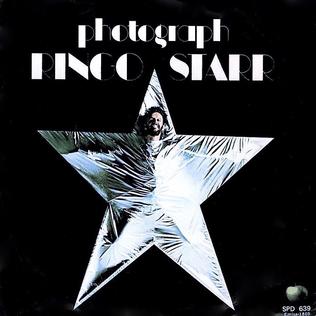
"Photograph" is a song by English rock musician Ringo Starr that was released as the lead single from his 1973 album Ringo. Starr co-wrote it with George Harrison, his former bandmate from the Beatles. Although they collaborated on other songs, it is the only one officially credited to the pair. A signature tune for Starr as a solo artist, "Photograph" was an international hit, topping singles charts in the United States, Canada and Australia, and receiving gold disc certification for US sales of 1 million. Music critics have similarly received the song favourably; Stephen Thomas Erlewine of AllMusic considers it to be "among the very best post-Beatles songs by any of the Fab Four".
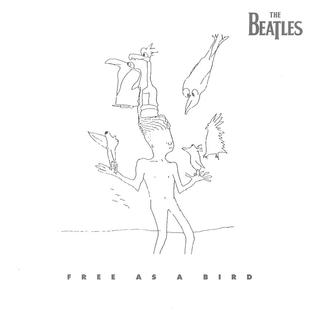
"Free as a Bird" is a single released in December 1995 by English rock band the Beatles. The song was originally written and recorded in 1977 as a home demo by John Lennon. In 1995, 25 years after their break-up and 15 years after Lennon's murder, his then surviving bandmates Paul McCartney, George Harrison and Ringo Starr released a studio version incorporating the demo.
"Marwa Blues" is an instrumental by English rock musician George Harrison. It was released on his final studio album, Brainwashed, in November 2002, a year after his death, and subsequently on a single as the B-side of "Any Road". The song is a slide guitar instrumental and named after Raga Marwa, an Indian classical raga traditionally played at sunset. "Marwa Blues" won the 2004 Grammy Award for Best Pop Instrumental Performance. Along with "Any Road" and the Brainwashed track "Rising Sun", it was also included on the 2009 compilation album Let It Roll: Songs by George Harrison.

The Concert for Bangladesh is a film directed by Saul Swimmer and released in 1972. The film documents the two benefit concerts that were organised by George Harrison and Ravi Shankar to raise funds for refugees of the Bangladesh Liberation War, and were held on Sunday, 1 August 1971 at Madison Square Garden in New York City. As well as notable performances from Harrison and Shankar, the film includes "main performer" contributions from Harrison's fellow ex-Beatle Ringo Starr, Billy Preston and Leon Russell, and a surprise walk-on from Bob Dylan. Other contributing musicians include Ali Akbar Khan, Eric Clapton, the band Badfinger, Klaus Voormann, Jesse Ed Davis, Jim Horn and Jim Keltner.


















